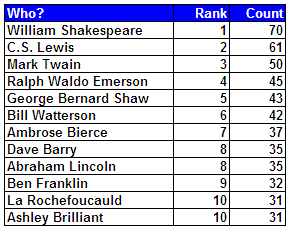Do not be too timid and squeamish about your actions. All life is an experiment. The more experiments you make the better. What if they are a little coarse, and you may get your coat soiled or torn? What if you do fail, and get fairly rolled in the dirt once or twice. Up again, you shall never be so afraid of a tumble.
Our chief want in life is someone who shall make us do what we can. This is the service of a friend. With him we are easily great.
Ralph Waldo Emerson (1803-1882) American essayist, lecturer, poet
Essay (1860), “Considerations by the Way,” The Conduct of Life, ch. 7
(Source)
Based on a course of lectures by that name first delivered in Pittsburg, 1851-03.
The glory of friendship is not the outstretched hand, nor the kindly smile nor the joy of companionship; it is the spiritual inspiration that comes to one when he discovers that someone else believes in him and is willing to trust him with his friendship.
A man builds a fine house; and now he has a master, and a task for life; he is to furnish, watch, show it, and keep it in repair, the rest of his days.
Ralph Waldo Emerson (1803-1882) American essayist, lecturer, poet
“Works and Days,” Society and Solitude, ch. 7 (1870)
(Source)
It is one of the blessings of old friends that you can afford to be stupid with them.
With consistency a great soul has simply nothing to do. He may as well concern himself with his shadow on the wall. Speak what you think to-day in words as hard as cannon-balls and to-morrow speak what to-morrow thinks in hard words again, though it contradict every thing you said to-day.
Nothing astonishes men so much as common sense and plain dealing.
Ralph Waldo Emerson (1803-1882) American essayist, lecturer, poet
Essay (1841), “Art,” Essays: First Series, No. 12
(Source)
The reward of a thing well done, is to have done it.
Ralph Waldo Emerson (1803-1882) American essayist, lecturer, poet
“New England Reformers,” lecture, Boston (1844-03-03), Essays: Second Series (1844)
(Source)
Reprinted in Essays: Second Series (1844).
I stir in it for the sad reason that no other mortal will move, and if I do not, why, it is left undone. The amount of it, be sure, is merely a Scream; but sometimes a scream is better than a thesis.
Let me never fall into the vulgar mistake of dreaming that I am persecuted whenever I am contradicted.
I could never think well of a man’s intellectual or moral character, if he was habitually unfaithful to his appointments.
Nathaniel Emmons (1745-1840) American Calvinist preacher
(Attributed)
No, folks don’t like the truth. … It’s easier lyin’. Stops us havin’ to fess up to trouble when it comes along. To do right insteada wrong. … But I hate a lie, Cass. My own most of all. They keep us crawlin’ in the dust when we could an’ should be climbin’ for the stars.
Garth Ennis (b. 1970) Irish writer
Preacher, #31, “Underworld”
What is the first business of one who studies philosophy? To part with self-conceit. For it is impossible for any one to begin to learn what he thinks that he already knows.
You and I want our lives to matter. We want our lives to make a real difference — to be of genuine consequence in the world. We know that there is no satisfaction in merely going through the motions, even if those motions make us successful, or even if we have arranged to make those motions pleasant. We want to know we have made some impact on the world. In fact, you and I want to contribute to the quality of life. We want to make the world work.
Werner Erhard (b. 1935) American self-improvement teacher [b. John (Jack) Paul Rosenberg]
(Attributed)
There is no good cause for religious persecution. No convert is true who comes to the faith through pain and fear. All persecution does is plant seeds of doubt amongst the hearts of the faithful as to the truth of their cause.
PEASANT: ‘Tis in such shifts
As these, I care for riches, to make gifts
To friends, or lead a sick man back to health
With ease and plenty. Else small aid is wealth
For daily gladness; once a man be done
With hunger, rich and poor are all as one.[ΑΥΤΟΥΡΓΌΣ: ἐν τοῖς τοιούτοις δ᾽ ἡνίκ᾽ ἂν γνώμης πέσω,
σκοπῶ τὰ χρήμαθ᾽ ὡς ἔχει μέγα σθένος,
ξένοις τε δοῦναι σῶμά τ᾽ ἐς νόσους πεσὸν
δαπάναισι σῷσαι: τῆς δ᾽ ἐφ᾽ ἡμέραν βορᾶς
ἐς σμικρὸν ἥκει: πᾶς γὰρ ἐμπλησθεὶς ἀνὴρ
ὁ πλούσιός τε χὡ πένης ἴσον φέρει.]Euripides (485?-406? BC) Greek tragic dramatist
Electra [Ἠλέκτρα], l. 426ff (c. 420 BC) [tr. Murray (1905)]
(Source)
(Source (Greek)). Alternate translations:When on these matters I reflect, I mark
How great the power of riches, to bestow
Upon the needy stranger, or expend them
To heal our bodies wasting with disease.
But for the diet of one day, is wealth
Of small importance : for the appetites
Of all men, whether rich or poor, demand
An equal share of necessary food.
[tr. Wodhull (1809)]It is in such cases, whenever I fail in my intentions, that I see how wealth has great power, to give to strangers, and to expend in curing the body when it falls sick; but money for our daily food comes to little; for every man when full, rich or poor, gets an equal amount.
[tr. Coleridge (1891)]But when my mind falls upon this subject, I consider how great a power wealth has, botht o bestow on strangers, and by expense to preserve one's body when fallen into sickness; but for one's daily food it comes to little. For every man once filled, rich or poor, bears an equality.
[tr. Buckley (1892)]In such things, when my thoughts turn thitherward,
I mark what mighty vantage substance hath,
To give to guests, to medicine the body
In sickness: but for needs of daily food
Not far it reacheth. Each man, rich and poor,
Can be but filled, when hunger is appeased.
[tr. Way (1896)]When I think of such things then I see what mighty power money has! Not only you help your friends with the stuff but you can also heal yourself from any illness when you have the money to pay. The cost of a normal everyday meal is cheap, because everyone, rich and poor, once he had enough he feels the same joy.
[tr. Theodoridis (2006)]It’s at times like this,
when I have no idea how to manage,
I think of the great power money has
for giving things to strangers and paying
to save someone whenever he falls sick.
The meals we need each day don’t come to much,
for all men, once they have eaten their fill,
feel much the same, whether rich or poor.
[tr. Johnston (2009), l. 515ff][...] whether rich or poor
Everyone is equal when their belly is full.
[tr. @sentantiq (2020)]
Waste not fresh tears over old griefs.
Curiosity is the clay from which all knowledge is formed.
Mark Evanier (b. 1952) American writer
Groo, Mini-Series I, #3 (The Sage) (Mar. 1998)
Many a friendship — long, loyal, and self-sacrificing — rested at first upon no thicker a foundation than a kind word.
Frederick W. Faber (1814-1863) British hymnist, theologian
(Attributed)
I have found that the greatest help in meeting any problem with decency and self-respect and whatever courage is demanded, is to know where you yourself stand. That is, to have in words what you believe and are acting from.
William Faulkner (1897-1962) American novelist
Letter to David Kirk, Oxford, Miss. (8 Mar 1956)
(Source)
There are two possible outcomes: If the result confirms the hypothesis, then you’ve made a measurement. If the result is contrary to the hypothesis, then you’ve made a discovery.
Enrico Fermi (1901-1954) Italian-American physicist
(Attributed)
The inexperienced, and crackpots, and people like that, make guesses that are simple, but you can immediately see that they are wrong, so that does not count. Others, the inexperienced students, make guesses that are very complicated, and it sort of looks as if it is all right, but I know it is not true because the truth always turns out to be simpler than you thought.
Richard Feynman (1918-1988) American physicist
The Character of Physical Law, ch 7 “Seeking New Laws” (1965)
(Source)
I have argued flying saucers with lots of people. … I was interested in this: they keep arguing that it is possible. And that’s true. It is possible. They do not appreciate that the problem is not to demonstrate whether it’s possible or not, but whether it’s going on or not. Whether it’s probably occurring or not, not whether it could occur.
The first principle is that you must not fool yourself — and you are the easiest person to fool.
Richard Feynman (1918-1988) American physicist
“Cargo Cult Science,” commencement address, California Institute of Technology (1974)
(Source)
Goodwill is the one and only asset that competition cannot undersell or destroy.
Marshall Field (1834-1906) American merchant
(Attributed)
If we would only give, just once, the same amount of reflection to what we want to get out of life that we give to the question of what to do with a two weeks’ vacation, we would be startled at our false standards and the aimless procession of our busy days.
Dorothy Canfield Fisher (1879-1958) American author and essayist
(Attributed)
The test of a first-rate intelligence is the ability to hold two opposed ideas in mind at the same time and still retain the ability to function. One should, for example, be able to see that things are hopeless and yet be determined to make them otherwise.
It seems to me that if we were all supposed to wind up in the same place, we would have been put there to begin with.
Nancy Flannigan (contemp.)
Belief-L
It is only when you recognize that you CAN do what Hitler did that you can consciously choose not to.
Joseph C. Fletcher (1905-1991) American ethicist
(Attributed)
I believe that the First Amendment should cover everything. Even the incredibly icky, distasteful stuff. Because if we let “them” start making ethical judgments, they might not stop until it’s nothing but Norman Rockwell and Hummel figurines.
There are those who have thought that Winslow was the ideal form for life itself. Advanced civilizations who hold this theory, while interesting for a while, tend not to last very long. A very few civilizations have decided that Winslow is merely the ideal form for small fuzzy green aligators and never quite understood what all the fuss was about. They are usually exterminated in holy wars by their neighbors.
MINSK: Dis iz turnink into vun of dose plans … the kind vere ve kill everybody dot notices dot ve’s killin’ people?
GORB: It is?
MINSK: Uh huh. And how do dose alvays end?
GORB: De dirigible iz in flames, everyboddyz dead an’ I’ve lost my hat.
MINSK: Dot’s right. Und any plan vere you lose you hat iz?
GORB: A bad plan?
MINSK: Right again!
We are living in a new culture, one of responsibility dodgers and corner cutters. Nobody cares if a thing is right or not. If you try to trace a poor job or craftsmanship back, you will find, inevitably, that nobody did it.
Robert Fontaine (contemp.)
(Attributed)
The one important think I have learnt over the years is the difference between taking one’s work seriously and taking oneself seriously. The first is imperative and the second disastrous.
Dame Margot Fonteyn (1919-1991) English dancer [b. Margaret Hookham]
Margot Fonteyn: An Autobiography (1976)
Don’t forget until too late that the business of life is not business, but living.
History has demonstrated that the most notable winners usually encountered heartbreaking obstacles before they triumphed. They won because they refused to become discouraged by their defeats.
Bertie Charles (B. C.) Forbes (1880-1954) American publisher
Forbes, Issue No. 1 (Sep 1917)
(Source)
A government big enough to give you everything you want is a government big enough to take from you everything you have.
Administrivia: W, not V
A reader was kind enough to point out that the W page was showing V quotes. I discovered what the error was, and things seem to be working again.
I encourage folks to write me (via the Contact Me link in the sidebar) if you run across errors in structure or format. WIST relies on your help!
Administrivia: Updates to A, B, and C
Finished going through A, B, and C for citations, and the updated files have been posted. (Of course, I added a bunch of quotes along the way. Otherwise, it would hardly be fun.)
Administrivia: Author, author!
I’ve reinstated one of the old features from the previous version of WIST, the list of quoted folk, now available in the Authors link in the sidebar.
I’ve not done it as a Table as I did before. It looked good, but, damn, it took forever to load a 1,500 row. Now it’s just bulleted text, and much faster.
The names are hyperlinked; ultimately, they’ll go to anchors on the right page where the person’s quotes start, but I’ll have to change the quotations exports to include those links. For the moment, they go only to the right page.
Administrivia: Saving Space
Just cut-over from the FrontPage pages to the MT pages. It appears to have gone nearly no hitch (a couple of graphics paths were a tad off).
One intersting item is looking at system resources used.
In FrontPage, the system took up 4.2Mb of space, consisting of 803 files in 41 folders under root.
In MT, the system takes up 2.2Mb of space, 153 files, 1 folder under root.
Note that’s with 300 extra quotations. And with all the content being duplicated between two directories (for odd reasons I won’t go into here).
Sweet.
Administrivia: Doing the numbers, 8/2003
For those who are interested in such things, here are some stats related to WIST.
First off, how many quotes do I actually have here?

Hmmm. Looks like I’ve been slacking. In reality, though, I’ve been focusing on cleaning up and fleshing out citations. Quality over quantity, so to speak.
Secondly, who said what — and who are the most “popular” quote-makers here?

Bear in mind, of course, that things like having a Shakespeare Quote-a-Day calendar could influence the count …
One last bit — total visitors to the front page of WIST since June 1999 have gone as follows:
September 2001: 8,400
Februrary 2002: 12,859
August 2003: 46,958
Cool!
Added on 19-Aug-03; last updated 19-Aug-03
Link to this post | Comments Off on Doing the numbers, 8/2003
Link to this post | Comments Off on Doing the numbers, 8/2003
Administrivia: Searching glances
I neglected to mention that I’m using Atomz for the search engine here. As a free (limited) service, they do some very slick search stuff, and because they provide contextual results (showin the words they found, in context), they are ideal here. I heartily recommend them.
UPDATE (24 Jul 07): No longer using Atomz, but the internal MT search system (possibly to be someday updated to MT FastSearch, or even possibly MTGoogle). Atomz (now part of WebSideStory) has done well by me, so I still encourage you to consider it in your own site design, even if it doesn’t fit mine any more.
Administrivia: MT promises
Unlike what I scribed previously, it wasn’t quite as trivial to plug this stuff into MT as I’d hoped, largely because of limits in HTML form entry sizes.
So instead I’m using Server Side Includes to bring in formatted text files to the entries. Still a lot of advantages to doing things this way (not least of which is that content and presentation are logically divided), but I thought I’d mention the problem I ran into.
Administrivia: Searching glances
Just going to show that I don’t actually search my own database often, I discovered in the MT redesign that the Atomz search index was all frelled up, and since I’d turned off automated reindexing, it had remained frelled up for a lengthy period time. Sorry about that. I’ve turned the scheduled reindexing back on.
One disadvantage to how I’m doing this WIST implementation in MT is that I can’t use MT’s built-in search engine. But, hey-presto, no biggie, because I can still use Atomz — and, it seems, Atomz is actually a better choice, since it gives contextual results. Cool.
Administrivia: Typography
This listing actually comes from a database I’ve put together myself. The database serves two purposes: to put together the web pages (in which case full typographical control is desireable) and to create the input file for my sig file (in which case the lowest common denominator is desired).
Rather than come up with something elaborate that translates stuff back and forth, for the moment you’ll have to put up with italicized items in the quotation text showing up as *starred*, and _underscored_, and other Net-like typographical conventions. If you don’t like it … sorry. Maybe I’ll do something fancier one of these days.
UPDATE (24 Jul 07): One of these days is now, since, working through MT, I can actually do rich text formatting and the like in HTML. Yay. I did some mass conversions of quotions to turn the _s and *s into italics — in some cases that messed up, so if you spot a problem, please let me know.
Administrivia: Sig files
For my e-mail sigs, I use a program named Siggy by Rick Osborne. It’s the nicest program of its sort on the Net, for my money (which was $0, since it’s freeware). Or at least it best fits my needs, which is much the same thing to me.
Rick Osborne doesn’t offer Siggy publicly any more (since he’s ostensibly making revisions to it), but if enough people ask him nicely, I’ll bet he’d post it again.
UPDATE (24 Jul 07): Don’t use Siggy any more, but it was a keen program for what I needed it for. Thanks again, Rick.
Administrivia: My database
This quotations list is generated from a Microsoft Access database I threw together in an afternoon, after having absolutely no luck finding a reliable quotations program that did what I want. Once upon a time I’d have written a full-blown program myself, but my hair has gotten too pointy (to use a Dilbert reference) for that.
Fortunately, the tools have gotten sophisticated enough that I almost didn’t have to do any programming at all. Hell, it will output both HTML and a text file my sig program will use; it almost makes the bloat worth it.
Almost. What I should be able to do is output this database to a static HTML format with few-to-no problems. But Access 97 had some serious limitations in going from report format to HTML, most particularly the bizarre idea that if a report has page breaks, Access should translate them into separate HTML pages. And Access 2000 either does the same thing, or else only works if you can run ASP on your server (or if you want to), none of which applies to me. Access XP only contniues the trend.
As a result, I had to do exports with manual HTML in them, and then do a lot of manual clean-up, which means that my WIST pages didn’t get updated very often. I load in information into the Access database fairly frequently, but the pages are more like an annual event. Or biennial.
There are other databases I could use, of course. But Access is, ah, easily accessed by me. And certainly it will be around for a while, and I’d hate to get all this stuff into a database that then gets bought out or goes away.
I’ve now thrown Movable Type into the mix having a couple of years of blogging under my belt. The advantage of MT over my previous posting tool, FrontPage, is …
… well, it isn’t FrontPage. Which means it doesn’t insist on occasionaly deleting everything else on my site, it doesn’t crash, and it doesn’t enrich Micro$oft’s coffers.
Beyond that, it lets me control the formatting through templates, and lets me take Access query output (rather than report output) and plug it into the MT entries with relative ease. That’s a Good Thing.
So the way I’m producing this page now is to run a query of all the quotations, with various HTML code bits thrown in. I export that to a text file, input it to Word, tweak around some things to generate line breaks, meld together quotation chunks of over 250 bytes, etc. Then I cut the quotes out by author letter of the alphabet and paste them into their respective 27 quotation entries.
That sounds like a lot of work, but it’s about 25% of what I was doing to get the stuff into FrontPage.
Ideally, I’d still like to produce the static pages directly out of Access, or else come up with some simple, unobtrusive way to generate pages for individual authors. If anyone reading this ….
- … knows how to make Access output to a static HTML format that doesn’t break at every page …
- … has an idea for a program to use that will either do much the same, or else will let me keep the database on the Web page without any fancy-schmancy add-ons that ISPs will charge me for …
- … has an easy way to go from queries to an MT input format that I could repopulate the database with
- Has any other ideas.
… then I’d love to hear about it. I might even pay for it. A little bit, at least. I’d certainly give credit where credit is due.
UPDATE (24 Jul 07): As later entries note, I’ve gone away from both the Access setup and the need for a custom system to something that works in Movable Type. Which only slighly bends the product beyond its parameters, so it’s all good. Would I mind a full-blow online quotations database dropping into my lap? No, but the need for it is a whole lot less urgent than it once was.
Administrivia: Whence do I get my quotations?
(And why the heck do I say “whence”?)
I’ve been collecting quotes for years. Here are some good places I’ve found for the budding (or wilting) researcher.
Books of quotations: Yeah, I actually read these things. Scary, isn’t it? Bartlett’s is the classic here, but Bergen Evans’ Dictionary of Quotations (which I borrowed in college from my friend, Dave Sutherland, and took to like a crack addict) is an even better source. One of these days I’ll list my quotation books more thoroughly.
Internet mailing lists: There are dozens of Internet mailing lists which will shoot you one or more quotes a day. I used to have an extensivel list here of ones that I subscribed to, but I realized that (a) I really was getting way too much e-mail, and (b) I was getting way too many repeats. Do some Googling on “quotation mailing list” and similar bits, or search in various mailing list directories (e.g., Yahoo).
Quote-a-day calendars: I always try to get at least one per year. Now you know what to get me for Christmas. This sometimes distorts my statistics, but, what the heck, it’s good fodder.
Internet research: Just do a search on “quotes” and “quotations” and stand back. A lot of places are pretty awful, but there are some real gems out there. I’d recommend the Bartleby.com quotations page. This has the (searchable) contents of the 1919 Bartlett’s, the 1996 Columbia World of Quotations, and the 1998 Simpson’s Contemporary Quotations, making up some 86k quotes all told. The citations are pretty good, too.
Another good site is Xrefer, though much of its content is no longer free.
Sometimes, especially with contemporary or “gaffe” quotes, verifying them is also important. The Urban Legends Reference Pages does some good debunking here.
Reading: I read a lot. A lot. If I run across something that looks worth quoting, I quote it. That leads to some authors being quoted in WIST who aren’t found in many other places. Just doing my part to add to the primary material out there.
Administrivia: Can’t tell your players without a program
So, how do I find out who actually said something?
Unfortunately, the Net, where I get a lot of my quotations these days, is no better than anywhere else about citations. In most cases — though not all — you’ll get at least the last name of the person who first crafted the quotation. Sometimes you’ll get a date range for their life. Rarely will you get the name of the work.
I’ve tried to fill in all the citation info in WIST that I can; if you have additional data or corrections, please feel free to contact me at the address in the sidebar.
The biggest problem one has in this sort of endeavor, after just plain old getting the data, is something most people probably wouldn’t think of: how to order people’s names.
For example, Fred von Smith. Is that under “V” or under “S”? If you set up a rule saying it should be “V” but everyone refers to him as just “Smith,” should that change your mind?
And there is, alas, no consensus. The two works I consulted most, Bartlett’s Familiar Quotations and my Webster’s Biographical Dictionary both came to opposite conclusions on the matter in a number of cases. They also had some intereresting variant spellings of names.
I’ve tried to take my cue from Bartlett’s. Where writers have pseudonyms, I have grouped their quotes under the more common name. The Search box should let you find where something is.
The other questionable item is nationality. Once I decided I wanted to give a little bit of biographical info on the various authors (since that provides context for the quotes), I initially took the lead from the Webster’s, which seems to use the nation in which the person eventually flourished (and or became a citizen of). Thus, Einstein was American. Later, I found that a number of places gave a mixed heritage — birthplace and flourish-place. So Einstein would become a German-American. I’ve made some changes based on that practice, but I’m not yet consistent.
Okay, one other possible stumbling block. Who actually said something? This can take a number of forms:
- A citation says “Jones,” with no other reference as to which Jones actually said it. This is relatively rare. Sometimes the name is so famous (Hawthorne, Melville), it’s obvious. Other times, it’s a crap shoot. A related problem is two people with the same name, but at different periods, who could have said something (the two Oliver Wendell Holmes, Senior and Junior, for example, or the two Senecas). I’ve made my best guess at this, but welcome any corrections.
- Did the person to whom a quotation is attributed actually say it? Or were they quoting somebody else? The more general the aphorism, the more people who may have said it (the record that I’ve found is five distinct names attributed to a particular quotation). Did they all say it? Were they quoting a common source, or coming up with a similar idea independently?
And, of course, there are problems with possible misspellings of attributions. I have a citation for a quote that says it was made by Fred Jonson. Nobody by that name in Webster’s, but there’s a Fred Johnson in there. Was the attribution a typo? Do I look like an idiot for changing the citation, or look like an idiot for leaving it as is?
When it comes to names, the other issue is how much of the name to put in. If someone has many given names (Winston Leonard Spencer Churchill), should it be cited as such? If someone is usually known by the first initials (H. L. Mencken), should I spell out those names? If someone is commonly known by their middle name (John Calvin Cooledge), is there value in giving the first name? I’ve made a number of choices here, trying to reach a balance between accuracy and still having the person be recognizable. Your mileage may vary. Mine certainly does each time I go through this exercise.
Given that I don’t have a wide array of biographical tools to exhaustively research every individual, and that I’ve grabbed the quotes where I can, sometimes the name listings are a little slim, missing dates, even first names. If you know who is being referred to there, please write me and let me know. (I would say, conservatively, that it takes me as much time to research and update my author biographies as it takes me to gather the quotes in the first place.)
One place I’ve found to search for biography is (surprise!) on the Net. It’s by no means a sure thing, and the tendency of quotations (complete with errors and misattributions) to be passed around the Web like monks passing along typos from copy to copy is certainly a barrier to good scholarship.
I’d say that WIST is one of the better-researched sites, but I acknowledge that the level of confidence in attributions should be placed somewhere around a high school senior paper.
That having been said, a few particularly good places on the Web to research:
- The Dead People Server (it has live people, too)
- The Biographical Dictionary Search Page
- Biography Find
- The Internet Movie Database (good for movie and TV personalities; also a good source itself for quotations)
- The McCain Library Online Catalog (library catalogs often include author born-died dates, as well as dates for the works themselves.)
Or, of course, you can just do a Google search for the name (searching both “Firstname Lastname” and “Lastname, Firstname” often gives different results). That’s what I did this most recent pass for all the names I couldn’t find otherwise.
Sometimes, when not able to find anything about “Reginald Knickerbocker,” I’ve found doing a Web look-up on the quotation is sometimes productive. You may find that the quite is attributed to “Reg Knickerbocker” (about whom you can further research). You may also find that the quotation is actually attributed to Hyman Fernly, which is valuable information in and of itself.
Some people can’t be found, at least through the Web. Since this is not my Real Job, I don’t have time to do more research than I do, but it’s still a bit disconcerting when the only thing on the Web about Hyman Fernly is that he uttered a particular sentence. It does make one wonder.
Added on 2-Jun-03; last updated 2-Jun-03
Link to this post | Comments Off on Can’t tell your players without a program
Link to this post | Comments Off on Can’t tell your players without a program
Administrivia: E-mail? How positively 1990!
In June 2001 I started running a free “quote a day” e-mail list. In April 2002, I changed from Topica (great service, excellent price, ugly ads) to my own listserver.
You can subscribe to it by going here.
Since I have some space to kill here, I’ll answer one of my most frequently asked questions (thus demonstrating that nobody asks me any questions), “So how do you put your daily WIST together?”
Well, around 5:30 p.m. or so, every day, I get a reminder up on my computer screen. “Have you sent your WIST today?” If I didn’t get this sort of warning, it would never happen. Read from that what you will.
I open up a blank e-mail. I put in the address I have for posting mail to my list.
I go into the body, and click on my “signature” button. This pulls in a random sig line from my copy of Siggy (see “Software” for more information).
Unless it’s something completely wrong for the day, I then glean a one or two word subject, put it in the subject line, and click Send. And away it goes.
My host’s MailMan magic mailing system does the rest of the work, appending in all the other stuff that fills each post.
I occasionally do a “theme” week, but by and large, it’s all randomly selected for your WISTing pleasure.
And now you know. And, as GI Joe would say, knowing is half the battle.
UPDATE: (17-Jul-07) I’ve disabled the mail link above because the new setup doesn’t support an automated process, and I’m not going to continue the WIST-by-mail unless that’s working (or is trivial to do).
Added on 2-Jun-03; last updated 13-Jul-23
Link to this post | Comments Off on E-mail? How positively 1990!
Link to this post | Comments Off on E-mail? How positively 1990!
Administrivia: Organization
WIST is organized by author, alphabetically (I’d love to be even more elaborate, but that must wait for a future revision). The letter links in the sidebar will take you to the page of those authors with names beginning in that letter. You can also search for authors (or quotation text, or sources) in the Search box.
(The section of links under that goes to various other informational parts of the WIST site. The Sources section includes information on how I alphabetized some names.)
Where items are cited to Anonymous or where ordering them by author name makes no sense (because it’s a one-off quote by an obscure individual), I’ve put them under the “~Misc” category. I’ve also included sig lines in that category where:
- It’s a quip, a bon mot, something that would fit on a bumper sticker or a button.
- Who said it is utterly unknown, or else who said it is so well known that to cite it adds no value and detracts from the quippiness.
- Where I felt like it.
Administrivia: Introduction
I’ve been collecting quotes, aphorisms, maxims, and sig lines since junior high (which is more years ago than I care to relate). I read books of quotations. I dog-ear pages in books I’m reading so that I can come back later and copy particularly good bits out. And, more recently, I quickly jot quotes I see down in my Palm so I can have a record of them.
When I first put together a quotations collection (a hard-copy effort, given as a Christmas gift to people who didn’t mind something that was cheap if it had the personal touch), I called the collection “WIST” for “Wish I’d Said That.”
That name is important because it’s not altogether true. This is not just a collection of quotations whose sentiments I agree with. In some cases there are ideas that I disagree with, firmly; in those cases, though, I’ve included the quote either because I admire the turn of phrase or else I thought it was so absurd, it made me smile just to read it.
But me repeat that in big, bold lettering, so that people don’t miss it:
In other words, don’t e-mail me a complaint just because I quoted someone saying something you object to.
Now, the fact is, I do agree with most of what I quote here. Hopefully it will become pretty obvious when I don’t (or, again, when it isn’t a matter of agreement, but just enjoying a particular expression of thought). And, of course, there are some quotations where I agree with them sometimes, disagree with others.
So if I don’t always wish I’d said something, why not change the name? Tradition, I suppose, plus it’s a handy catch phrase.
Administrivia: Playing with Movable Type
I’m experimenting with how to make WIST work, with minimum fuss and maximum ease of updating, in MT. So far, so good.
One potential problem is that I want to have different ways of presenting entries — the alphabetical quotation pages very stripped down, but things like these News entries with the full date info and so forth. Haven’t figured that one out yet.
Added on 2-Jun-03; last updated 2-Jun-03
Link to this post | Comments Off on Playing with Movable Type
Link to this post | Comments Off on Playing with Movable Type


































